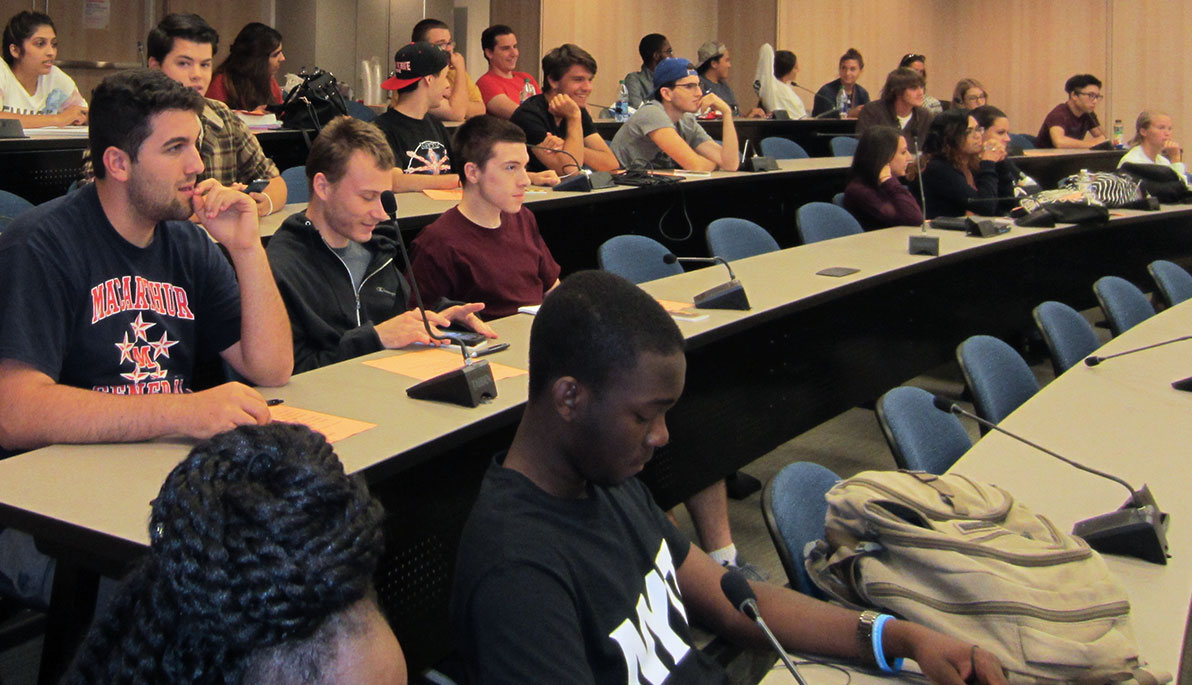
Has Big Money Hijacked Democracy? NYIT Looks for Answers.
September 27, 2016
It has been 229 years since the U.S. Constitution was signed. To celebrate Constitution Day, the federal observance that honors the occasion every September 17th, NYIT's Department of Social Sciences hosted a panel discussion, “The U.S. Constitution: Has Big Money Hijacked Democracy.”
“This year, the event was especially important because of the election and because it’s the first time many students are voting,” said Associate Professor and Chair of the Department of Social Sciences Ellen Katz, Ph.D., who also moderated the event. “Leading up to the discussion, we distributed 300 pocket-sized constitutions to students and had faculty members prep their students on topics in class.”
Speaking to an audience of more than 70 students (live in Harry J. Schure Hall on the Old Westbury campus and remotely to those in Manhattan), panelists tackled subjects like campaign finance spending, electronic voting, and what constitutes protected speech. But one question seemed to generate the most interest from the student audience: Why don’t Americans vote and what are the repercussions if they don’t vote?
“People don’t realize that they have the power to stop the corruption of our democracy,” said Associate Professor Leslie Schuster. Professor King Cheek agreed. “They simply don’t understand that they control the country’s destiny.” In addition to Schuster, Cheek, and Katz, panelists included College of Arts and Sciences faculty members Nicholas Bloom, Michael Izady, Joanne Grasso, Eugene Kelly, and Paul Tagliaferri.
Other topics discussed included Citizens United v. FEC—a court case that deals with the regulation of campaign spending by organizations—and the issues surrounding money and politics and the role money plays in an election.
Held on September 15, the event was organized by the Department of Social Sciences in the College of Arts and Sciences with participation and support from the Division of Student Affairs.
During the Q&A that followed the presentation, Gary Salgado, a student in his third semester, asked “What can be done to get people to vote?” and suggested making voting mandatory like in his home country of Peru. His idea prompted senior Connor Appel to respond that “in a free state like America, you cannot force the people to vote.”
Salgado later considered what he had heard. “I got confirmation that people don’t care [about voting], which I kind of expected,” he said. “I heard a lot of provocative things from the panelists that opened up many discussions. Today’s topic is really important. That’s why I came here.”
“If students are informed, they can take action and make real change,” said Katz. “My hope is to continue to grow this event every year and delve into more areas of the constitution and related issues.”
This semester, with the presidential election on the horizon, NYIT is organizing a number of initiatives around politics, the election, and voting, including through #NYITVotes2016. Join other members of the NYIT community and get involved. Sign up to receive election reminders, learn for ways how you can get out the vote, register, and more: nyit.turbovote.org.
More Features

An Alumnus’ Commitment to the Environment
As an energy management graduate from New York Tech’s Vancouver campus, Jasdeep Gulati (M.S. ’22) is highly invested in educating people about environmental and climate sustainability.

Vancouver Faculty Win University-Sponsored Research Awards in New Program
The new Global Impact Research Grant (GIRG) program has been developed to keep Vancouver-based faculty connected to faculty and research projects being conducted on the university’s New York campuses.

Studying Climate Change One Degree at a Time
Junhua Qu (M.S. ’24) began her collegiate journey in Beijing. But, her interest in climate change took her to New York Tech’s Vancouver campus to study energy management.
